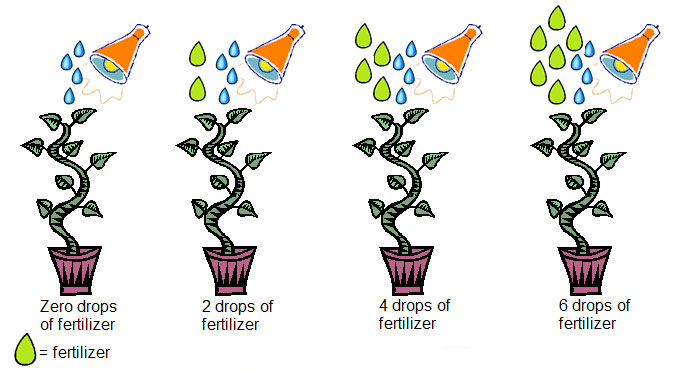
The first step in writing a hypothesis is to identify the independent and dependent variables in the experiment. (If you are not sure what the independent and dependent variables are, review the lesson titled “Experimental Design” in the Related Resources.)
Look at the scientific research question above. See if you can identify the independent and dependent variables.
Now that you have identified the independent and dependent variable, you can easily write the hypothesis. The hypothesis should be written in the form of an “if-then” or “as-the” statement linking a change in the independent variable to a predicted change in the dependent variable.
An easy way to write a hypothesis is to follow this simple formula.
If the (independent variable) (verb or verb phrase describing how the independent variable is changed), then the (dependent variable) will (verb or verb phrase predicting how the dependent variable will change).
The picture below shows the setup of the fertilizer and plant growth experiment.

Notice there are different amounts of fertilizer (zero drops, 2 drops, 4 drops and 6 drops) being applied to the plants. These are the levels or conditions of the independent variable. The conditions or levels of the independent variable will determine the verb you add to the first part of the hypothesis. In this investigation, the number of drops of fertilizer is increasing (from zero up to 6 drops) so you could use the word increases in the first part of your hypothesis.
The verb that follows the dependent variable in the second part of the hypothesis should be your prediction of what will happen to the dependent variable. So, a sample hypothesis might be as follows:
Sometimes you will see hypothesis written as an “as-the” statement. You would write the same hypothesis but use the words “as-the” instead of “if-then.” For example,
Writing a hypothesis for a comparative investigation can be a little more difficult than you think. Remember, the hypothesis of a comparative experiment identifies which level or condition of the independent variable will perform the best when the dependent variable is applied.